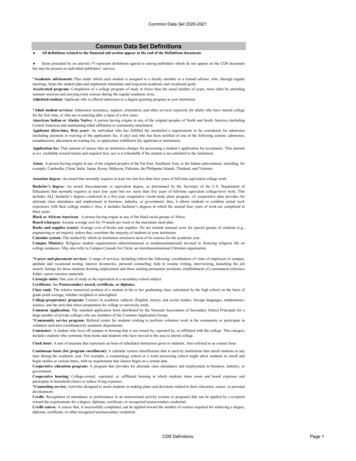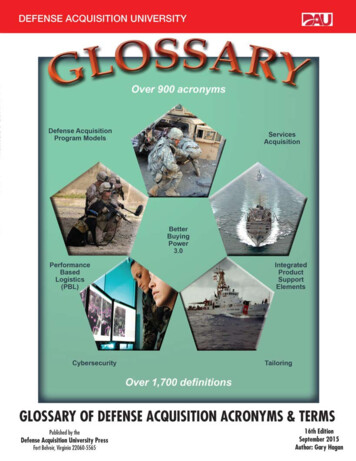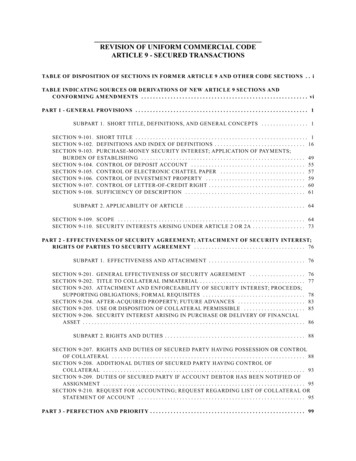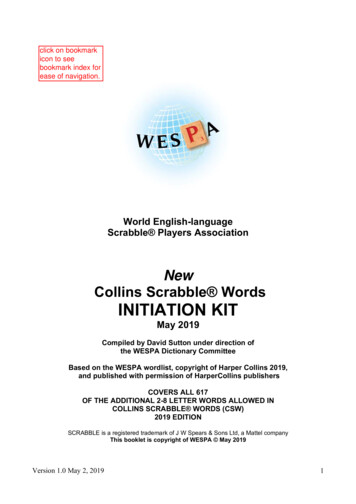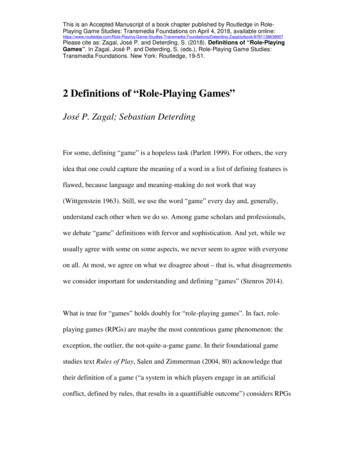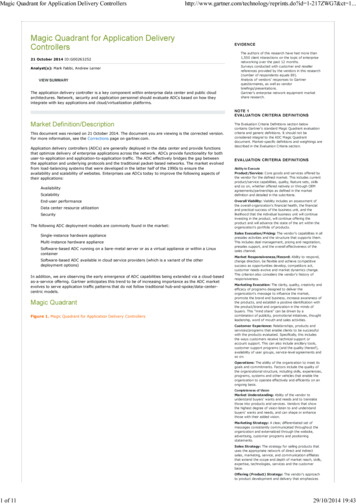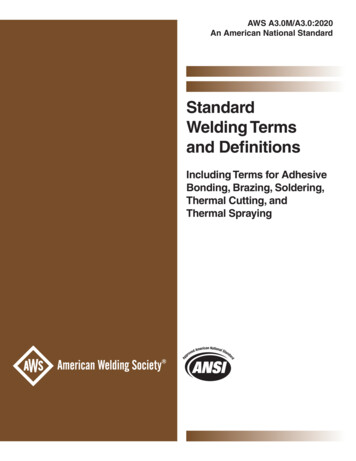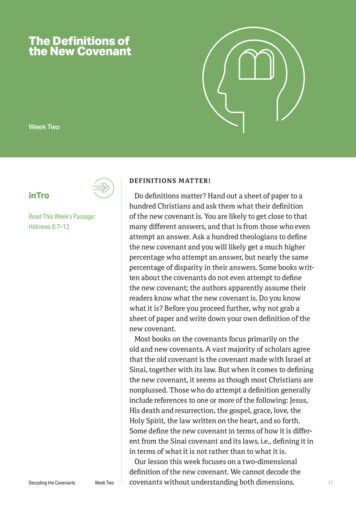
Transcription
The Definitions ofthe New CovenantWeek TwoDEFINITIONS MATTER!inTroRead This Week’s Passage:Hebrews 8:7–12Decoding the CovenantsWeek TwoDo definitions matter? Hand out a sheet of paper to ahundred Christians and ask them what their definitionof the new covenant is. You are likely to get close to thatmany different answers, and that is from those who evenattempt an answer. Ask a hundred theologians to definethe new covenant and you will likely get a much higherpercentage who attempt an answer, but nearly the samepercentage of disparity in their answers. Some books written about the covenants do not even attempt to definethe new covenant; the authors apparently assume theirreaders know what the new covenant is. Do you knowwhat it is? Before you proceed further, why not grab asheet of paper and write down your own definition of thenew covenant.Most books on the covenants focus primarily on theold and new covenants. A vast majority of scholars agreethat the old covenant is the covenant made with Israel atSinai, together with its law. But when it comes to definingthe new covenant, it seems as though most Christians arenonplussed. Those who do attempt a definition generallyinclude references to one or more of the following: Jesus,His death and resurrection, the gospel, grace, love, theHoly Spirit, the law written on the heart, and so forth.Some define the new covenant in terms of how it is different from the Sinai covenant and its laws, i.e., defining it inin terms of what it is not rather than to what it is.Our lesson this week focuses on a two-dimensionaldefinition of the new covenant. We cannot decode thecovenants without understanding both dimensions.17
inScribeWrite out Hebrews 8:7–12 fromthe translation of your choice.You may also re-write the passagein your own words, outline, ormind-map the chapter.18The Definitions of the New Covenant
THE DNA OF THE NEW COVENANTinGestGo back to your scribed text andstudy the passage.Circle repeated words/phrases/ideasUnderline words/phrases thatare important and have meaningto youDraw Arrows to connect words/phrases to other associated orrelated words/phrasesWhat special insights do yourmarks seem overall to point to?Memorize your favorite versein Hebrews 8:7–12. Write itout multiple times to helpmemorization.What four promises does Godmake to His people in Hebrews8:7–12 and what do they meanpersonally to you?Read more atwww.inversebible.org/cov02-3Decoding the CovenantsWeek TwoIf only God Himself had given a clear, straightforward definition ofthe new covenant. Oh, but wait, He did! In the inScribe verses for thisweek, God Himself defines the new covenant! No equivocation, noambiguity, no obscurity; just a straightforward definition that mostanyone could understand.But before we get to the definition proper, here is a brief backstory.God first announced and defined the new covenant in the OldTestament through Jeremiah (Jer. 31:33, 34). Hebrews in the NewTestament picked it up straight from Jeremiah. In the longest NewTestament quotation of an Old Testament passage, Hebrews 8:7–12quotes Jeremiah 31:31–34, essentially verbatim. God defines the “newcovenant” (Heb. 8:8) as four promises He makes to His people.Promise 1: He promises that He will write His laws in their hearts(Heb 8:10), to sanctify them, to make them holy, aligning their heartsand characters with His. When God gave Israel His law at Sinai, thepeople immediately responded, “All the words which the LORD hassaid we will do, . . . and be obedient” (Exod. 24:3, 7, NKJV), as in, “We’regood, God; we got this.” But they weren’t good, not that good; andthey hadn’t “got this” (recall the golden-calf incident at this point!).He wants them to know that He didn’t give them His law to challengethem to try and keep it. “He knows our frame; He remembers that weare dust” (Ps. 103:14, NKJV). He gave it to them as a promise of thekind of people He would make of them if they would rely on Him andtrust Him. “I will give you a new heart and put a new spirit within you . . and cause you to walk in My statutes” (Ezek. 36:26, 27, NKJV).Promise 2: He promises to be their God and make them His people(Heb. 8:10) to reconcile them to Himself. Isaiah warned, “Your iniquitieshave separated you from your God” (59:2, NKJV), the most vulnerablecondition possible for people living in a hostile environment such asour world. God says, “I want to be your shield and refuge. Rely on Me,trust Me; let Me do my thing on your behalf.” God would reconcile usthrough Christ’s death on the cross (2 Cor. 5:17–21).Promise 3: God promises to reveal Himself to the whole world, andHe promises that the day is coming when that will not be necessaryanymore, because everyone will know Him, from the least to thegreatest (Heb. 8:11)—the harmony of Eden will be restored. Until thatday of final consummation, He invites those who already know Him toteam up with Him and other believers in His mission to make Himselfknown within their own circles of influence (Matt. 28:19, 20).Promise 4: God promises to forgive our sins and remember them nomore (Heb. 8:12), in order to justify us so that we stand before Godas though we had never sinned. At some point in human history, theCovenant Maker Himself came from heaven to earth to shed His “bloodof the everlasting covenant” to make this possible and to make it hardto resist.These four promises shout out that God has made sure anyone whoreally wants to be in His eternal kingdom can be, because He hascommitted Himself and all of His resources to make it happen! GodHimself defines the new covenant by these four promises; they are theDNA of the new covenant. In short, the new covenant is the gospel!Why don’t more Christians already know this? God couldn’t havemade it plainer. Could it be that some sinister force is at work to dullpeople’s minds and veil their hearts to the gospel lest people hear it,understand it, believe it, walk in it, and receive the full inheritanceprepared for them from the creation of the world?19
RESPONDING: THE EXPERIENTIAL DIMENSION OF THE COVENANTSIn the preface to God’s definition of the new covenant, He says: “Ifthat first covenant had been faultless” (Heb. 8:7, NKJV), there wouldhave need no need for a new covenant. So what was so “faulty”(“wrong” NIV) with the first covenant that required a new one?Surprisingly, God does not list things here like a weak humanpriesthood or animal sacrifices that could not accomplish forgiveness,and so forth, or anything at all that directly pertains to the covenantitself which He made with His people. Rather, He explicitly explainswhere the fault lies: “Finding fault with them . . . I will make a newcovenant . . . —because they did not continue in My covenant, andI disregarded them, says the LORD” (vv. 8, 9, NKJV, emphasis supplied).Here, in straightforward, unambiguous language, God instructs usthat when He thinks of covenant, and when Scripture speaks aboutcovenant, He includes how people respond to the promises and appealsHe made through the covenants as well. Furthermore, He refers tothe three types of covenants covered from last week: the archetypaleverlasting covenant and its origin in the nature of the Trinity; itsadaptation in the covenant of grace designed to redeem humanityfrom the pandemic of sin; and to the historical covenants’ progressiveunveiling of the full gospel throughout history.There are historical old and new covenants and there are experientialold and new covenants. Just as surely as there are a series of historicalold covenants (with Adam, Abraham, Israel, and so on) and a historicalnew covenant (initiated when Jesus came in history), so too are thereexperiential old and new covenants depending on how people respondto the gospel promises and appeals God made and makes throughHis historical covenants. The secret to decoding the covenant(s)includes understanding the gospel promises as they are revealed in thehistorical covenants and the responses of the people to those promises.An experiential old covenant may be defined as responding to thegospel by rejecting it outright or by accepting it outwardly only,complying with it legalistically to gain heaven and escape hell. Itrepresents an unconverted life. An experiential new covenant is definedas responding to the gospel internally, from the heart, by faith in, andreliance on, the promises of God, resulting in an obedience that issuesnaturally through the indwelling of the Holy Spirit, who writes God’slaw on one’s heart.Paul describes his life before conversion as a life of “confidence inthe flesh” (Phil. 3:3), religious to the hilt, obedient to the law fromchildhood up, confident that concerning a “righteousness, which is inthe law [he was] blameless” (v. 6, NKJV; “faultless” in NIV). Though hewas living in the new covenant historical era, he had an old covenantexperience. After his conversion to Jesus, he considered his previousobedience “as rubbish” (NKJV) and accepted a new “righteousness . . .through faith in Christ, the righteousness that comes from God on thebasis of faith” (vv. 8, 9, NIV)—a new covenant experience.To think of the old and new covenants as experiences in other thanexclusively historical terms will be a new skill for many of us. But GodHimself pointed us in this direction when He said He would not haveneeded a new covenant had He not found fault with the people becausethey failed to “continue in My covenant” (Heb. 8:9, NKJV). Theirresponse to His covenant had resulted in an old covenant experiencewithout hope. He responded with a new covenant, appealing for a newcovenant response and a new covenant experience in which they wouldfully, faithfully, obediently embrace the inheritance He had preparedfor them from the beginning of the world.20inTerpretAfter looking at your scribedand annotated text, what specialinsights do your marks overallseem to point to?What questions emerge afterstudying this passage? Whatparts are difficult?What other principles andconclusions do you find?Have you had an “old” or “new”response to the covenants?Why?Read more atwww.inversebible.org/cov02-4The Definitions of the New Covenant
inSpectWhat relationship do thefollowing verses have withthe primary passage?Jeremiah 31:31–34Deuteronomy 5:27–29Matthew 28:19, 20Philippians 3:3–11John 12:32Hebrews 4:2What other verses/promisescome to mind in connectionwith Hebrews 8:7–12?Review your memorized versefrom Hebrews 8:7–12.Decoding the CovenantsWeek Two21
KNOWING JESUSIn His preface to, and definition of, the new covenant, Jesus sharesthe deepest longings of His heart for every person on the planet tobe with Him forever. He can envision a day when everyone on earth,“from the least of them to the greatest” (Heb. 8:11, NKJV), willknow Him (part of His third new-covenant promise and revelationabout Himself). They will know more than knowing about Him, as inchecking off on a survey that they had heard about Him, or even thatthey had attended Bible classes and/or church services and could geta decent grade on a test about things He had done and said during Hislife here. They would really know Him: Knowing how much He loves them, that He is crazy about them, andthat He loves it when they are happy and He feels it deeply when theyaren’t Knowing Him as in trusting that He is always there for them evenwhen they cannot sense it Knowing Him as the One with whom they can share their deepestthoughts, feelings, frustrations, discouragements, joys, and justanything and everything they think about and feel, and believing thatHe cares about it all and wants to be involved Knowing Him as in desiring every day to have Him involved in theirlives—at home, at school, at work, in their relationships, wherever, inwhatever, and with whoever they are involved Knowing Him as in considering Him their very best friend; they go tobed and wake up thinking about HimFor real, deep down, knowing Him.But also desiring to know Him at deeper levels still. So, desiring tohang out with people you can sense also love Him and know Him;sharing your experiences with Jesus, your insights into who He isbased on your study of the Bible, the writings of Ellen White, andother spiritual resources; and discussing the questions you have aboutHim.It is knowing Jesus at such a deep level that one of your greatestexcitements is sharing Him with acquaintances who don’t yet knowHim, or who know about Him but do not really know Him at a levelthat brings them joy, hope, and a purpose to live for every day.Jesus longs for the day when everyone will know Him at that level,“from the least of them to the greatest”—from the homeless orphanpicking through the garbage dump to find food enough for thatday for him and his little sister to the lost power broker who dinessumptuously every day and never gives a dime to charity. Jesus’new covenant promises assure that everyone who will not resist thecontinual drawing of the Holy Spirit on their hearts will be drawn toJesus through repentance and faith, be reconciled to God, forgivenof their sins, and sanctified through the writing of His law on theirhearts, resulting in an “obedience that comes from faith” (Rom. 1:5,NIV). He wants no one to be left out of the potentiality and the hopeoffered to them in His new covenant.22inViteMeditate on Hebrews 8:7–12again and look for where Jesus is.What is He saying to you throughthe texts of the week?How do you see Jesus differentlyor see Him again?How do you “know” Jesus in thenew covenant sense?Prayer Response: How do yourespond to what you know ofChrist?Read more atwww.inversebible.org/cov02-6The Definitions of the New Covenant
COMMUNION WITH THE INFINITE ONEinSightReview the memory verse.How does it apply to yourlife this week?After this week’s study of thetext, what are applications youare convicted of in your “inner”spiritual life?What practical applicationscan you make in your “outer”spiritual life?Read more inSight from the“ ‘I will pour water upon him that is thirsty, and floods upon the dryground.’ Isaiah 44:3. Those who hunger and thirst after righteousness,who long after God, may be sure that they will be filled. The heart mustbe open to the Spirit’s influence, or God’s blessing cannot be received.“We are so erring and short-sighted that we sometimes ask for thingsthat would not be a blessing to us, and our heavenly Father in loveanswers our prayers by giving us that which will be for our highestgood—that which we ourselves would desire if with vision divinelyenlightened we could see all things as they really are. When ourprayers seem not to be answered, we are to cling to the promise; for thetime of answering will surely come, and we shall receive the blessingwe need most. . . . Then do not fear to trust Him, even though youdo not see the immediate answer to your prayers. Rely upon His surepromise, ‘Ask, and it shall be given you.’ . . .“Through sincere prayer we are brought into connection with themind of the Infinite. We may have no remarkable evidence at the timethat the face of our Redeemer is bending over us in compassion andlove, but this is even so. We may not feel His visible touch, but Hishand is upon us in love and pitying tenderness. . . .“A closet of communion may be found wherever we are. We shouldhave the door of the heart open continually and our invitation going upthat Jesus may come and abide as a heavenly guest in the soul. . . .“Keep your wants, your joys, your sorrows, your cares, and your fearsbefore God. You cannot burden Him; you cannot weary Him. He whonumbers the hairs of your head is not indifferent to the wants of Hischildren. ‘The Lord is very pitiful, and of tender mercy.’ James 5:11.His heart of love is touched by our sorrows and even by our utterancesof them. Take to Him everything that perplexes the mind. Nothing istoo great for Him to bear, for He holds up worlds, He rules over all theaffairs of the universe. Nothing that in any way concerns our peaceis too small for Him to notice. There is no chapter in our experiencetoo dark for Him to read; there is no perplexity too difficult for Him tounravel. No calamity can befall the least of His children, no anxietyharass the soul, no joy cheer, no sincere prayer escape the lips, ofwhich our heavenly Father is unobservant, or in which He takes noimmediate interest. ‘He healeth the broken in heart, and bindeth uptheir wounds.’ Psalm 147:3. The relations between God and each soulare as distinct and full as though there were not another soul upon theearth to share His watchcare, not another soul for whom He gave Hisbeloved Son. . . .“We should keep in our thoughts every blessing we receive fromGod, and when we realize His great love we should be willing to trusteverything to the hand that was nailed to the cross for us.”(Ellen G. White, Steps to Christ, 95–103.)Spirit of Prophecy atwww.inversebible.org/cov02-7Decoding the CovenantsWeek Two23
inQuireShare insights from this week’smemory verse and Bible studyas well as any discoveries,observations, and questionswith your Sabbath School class(or Bible study group). Considerthese discussion questions withthe rest of the group.How would you have defined thenew covenant before studyingHebrews 8:10–12?How is it possible that some donot rely on Hebrews 8:10–12as their definition of the newcovenant?Why do you think God saidthat what necessitated a newcovenant was how the peopleresponded to the old covenant?Why would God consider how oneresponds to His covenant to besuch a big deal?What is the main differencebetween knowing God andknowing about Him?How has clarifying the newcovenant helped your view of Godand/or the Bible?How have you responded to thecovenant promises of God?24The Definitions of the New Covenant
old and new covenants. A vast majority of scholars agree that the old covenant is the covenant made with Israel at Sinai, together with its law. . basis of faith" (vv. 8, 9, NIV)—a new covenant experience. To think of the old and new covenants as experiences in other than exclusively historical terms will be a new skill for many of us .


